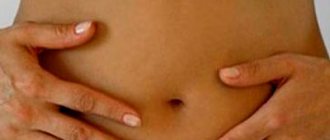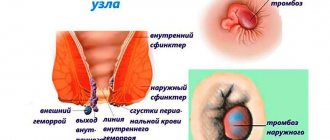During the period of bearing a baby, a woman may experience various sensations of discomfort. Intestinal problems during pregnancy are one of these negative aspects. The process of bearing and giving birth to a child always brings many positive feelings into the life of a young mother. However, in some cases, during this important natural event, a variety of pathological manifestations may occur. One of these is considered to be the presence of problems with intestinal functionality during pregnancy.
The body of the expectant mother undergoes many changes over the course of 9 months. This is primarily due to the restructuring of the hormonal system and its influence on the functioning of all organs of a pregnant woman. Practice shows that this process is considered absolutely normal. Problems arise only if all of the above changes in the body of the expectant mother begin to be pathological. Therefore, it is important to know the main causes and consequences of disturbances in the intestines of a pregnant woman.
Is diarrhea possible in the early stages?
No woman is immune from diarrhea in the first trimester. Moreover, intestinal upset can occur against the background of complete well-being.
Treatment for this condition should begin immediately upon its onset. And if a healthy person can take antidiarrheal drugs that help quickly stop loose stools, then during pregnancy things are different, because these drugs are prohibited for expectant mothers.
It should be noted that diarrhea during gestation can lead to involuntary abortion.
Frequent stools before delay are not associated with physiological changes in the functioning of the body.
Carrying out prevention
Overhauling your diet is one of the best ways to prevent intestinal upset during pregnancy. Particular attention should be paid to the quality and freshness of products, as well as their composition. From the diet it is worth removing raw eggs and milk, mayonnaise (due to the risk of containing salmonella), as well as cottage cheese (can be consumed after heat treatment), liver, sweet and carbonated drinks, mushrooms, yeast bread, and confectionery. Meat and fish can only be eaten after careful heat treatment. During pregnancy, taste preferences can change dramatically, and since new foods and their combinations are unusual for the intestines, innovations in the diet often negatively affect the functioning of the gastrointestinal tract. Therefore, it is better to refrain from food experiments and eat dishes that are familiar to you.
You should remember the following factors: physical activity, swimming, fitness, yoga - in every city there are now a lot of classes for pregnant women, where exercises are selected specifically for expectant mothers. It is important to remember about hygiene - constantly wash your hands, as well as vegetables, fruits and even milk cartons; and most importantly, take care of yourself, both morally and physically, do not lose calm over trifles and avoid heavy physical activity.
Causes
Let's look at the main reasons for rare and frequent bowel movements while expecting a baby:
- Intestinal disorders. The pregnant woman's body weakens significantly. The immune system is also rebuilt (this is necessary to preserve the embryo), which is why it does not resist microbes.
- Diarrhea can be a special reaction of the female body to pregnancy. Such reactions also include nausea, heartburn, flatulence, and constipation.
- Toxicosis. At an early stage, it is toxicosis that most often causes loose stools in women. Expectant mothers' perception of smells and tastes changes; they may consume unusual foods or completely inedible items. This provokes frequent bowel movements. Such diarrhea usually does not require drug correction. It is enough for a woman to change her diet.
- Taking microelements and medications in the form of vitamins. Some synthetic vitamin analogues can cause vomiting or nausea in women.
- Changes in hormonal levels also contribute to diarrhea. Therefore, if loose stools appear due to the production of prostaglandins in the later stages, then this is normal. But the appearance of diarrhea in the first trimester is a dangerous situation: a woman should urgently consult a gynecologist to avoid the threat of miscarriage.
- Increased load on the digestive tract.
- Exposure to bacteria, viruses, toxins. In this case, the disease is very severe and is accompanied by high fever, vomiting, and sometimes fever.
- Mental instability.
Why do pregnant women have problems with bowel function?
During pregnancy, the entire body is rebuilt, and the functioning of many organs changes. This also applies to the intestines. The most noticeable changes:
- The growing uterus puts pressure on all organs and the intestines too. This leads to disruption and slowdown of peristalsis.
- An enlarged uterus puts pressure on the veins, which disrupts the blood supply to the intestines, which negatively affects its functioning.
- During pregnancy, sensitivity to substances that stimulate intestinal motility decreases. They can also cause an increase in uterine tone, which can lead to miscarriage. By reducing sensitivity to stimulant substances, the body protects itself from miscarriage and premature birth, but this negatively affects intestinal motility.
- During pregnancy, the level of the hormone progesterone increases in the body, and it has a relaxing effect on the uterus. At the same time, the effect of this biologically active substance also affects the intestines, slowing down its peristalsis.
- Intestinal motility is also affected by iron supplements taken to prevent anemia. They are often included in complex vitamins for pregnant women.
- Expectant mothers often suffer from anxiety and tearfulness. Frequent stress also slows down peristalsis. In the same way, sedatives that have to be taken in stressful situations affect the functioning of the intestines.
Microbial activity
Diarrhea can be caused by exposure to pathogenic organisms. In this case, the leading symptom indicating a bacterial infection is high temperature. Infectious pathologies of the digestive tract can be accompanied by nausea, vomiting, weakness and discomfort in the abdominal area. Stools are very frequent and loose.
Diarrhea can be caused by the following diseases:
- dysentery;
- salmonellosis;
- rotaviruses;
- enteroviruses.
Dysbacteriosis disrupts the balance of beneficial and harmful microflora in the intestines.
As a result of the proliferation of pathogenic bacteria, the amount of toxins increases, which irritate the intestinal walls and cause diarrhea. As a rule, it is eliminated after the balance is normalized.
What are the types of stomach and intestinal disorders?
When you have an upset stomach, there is a whole complex of symptoms that causes discomfort. And it’s not always the case that it immediately turns to problems with stool. What else can be classified as forms of intestinal dysfunction during pregnancy?
Malfunctions in the gastrointestinal tract manifest themselves in different ways:
- Heaviness in the rib area, it can also appear in the throat;
- Vomit;
- Bloating;
- Increased gas formation;
- Stings in the side.
Enzyme imbalance
Diarrhea is caused by a lack of enzymes. These include pepsins, pancreatic digestive enzymes such as lipase, protease and amylase. If there is a deficiency of any of them, digestion cannot occur, and undigested food fragments accumulate in the intestines. They cause irritation and diarrhea.
Diarrhea occurs as a response to toxins entering the body. They can be in any food, especially spoiled food.
It is possible that toxins enter the body with foods treated with pesticides. Such poisoning is accompanied by vomiting, nausea, and discomfort in the head and abdomen.
There is a separate type of intestinal disorder - the so-called traveler's diarrhea. It appears due to eating unusual foods. Such diarrhea is eliminated after nutritional correction.
How to make sure that you are pregnant?
Diarrhea is one of the first signs of pregnancy only in combination with other symptoms. If you suspect that you may be pregnant and have diarrhea, it is rash to conclude that you are pregnant.
In order to confirm this, you need to use more accurate methods:
- For example, measure your basal temperature for several days (it will rise when pregnancy occurs, remember?);
- One proven method is to perform the test after the delay has occurred;
Test strips today can be purchased at any pharmacy; they are used for express diagnostics using morning urine (you may be interested in the article: The most sensitive pregnancy test>>>).
The substance contained in the strip will react to changes in the level of the hCG hormone, the concentration of which is maximum in the morning.
At the same time, to be sure, it is better to take 2 - 3 tests from different manufacturers, because the risk, although insignificant, of a false negative (as well as a false positive, by the way) result exists.
- Also, if menstruation is delayed, ultrasound diagnostics can be done. The specialist will determine the presence of pregnancy and the approximate due date.
- If you are worried about the onset of diarrhea and you suspect the possibility of conception, but you need to wait a few more days before the delay, donate blood to determine the level of hCG. It can be detected in the blood earlier than in the urine (read: Blood test for pregnancy>>>).
Pregnancy is a process that requires every woman to take a prudent approach to her regimen, nutrition, and well-being. Therefore, diagnose it using proven methods.
Inflammatory pathologies
Diarrhea is a symptom of inflammatory pathologies of the digestive tract that are not associated with bacteria.
These include:
- gastritis;
- cholecystitis;
- enteritis;
- colitis;
- some autoimmune pathologies, in particular Crohn's syndrome.
These diseases during pregnancy are dangerous due to chronic diarrhea and prolonged dehydration of the body.
Could diarrhea be a sign of pregnancy?
It would seem at first glance a funny question: “Is diarrhea the first sign of pregnancy?” - can be considered stupid. In fact, many medical papers and seminar topics are devoted to this topic. A woman’s body changes throughout the 9 months of fetal development. During this period, changes are possible in all functioning systems.
Diarrhea is, first of all, a signal of some changes in the body. This may include poisoning, onset or delay of menstruation, diarrhea and pregnancy. Everyone accepts toxicosis normally and has long gotten used to the fact that this is an integral part of a pregnant woman’s condition. So why shouldn't diarrhea be considered a sign of pregnancy? Its manifestations are also closely related to the intestines, stomach and toxicosis.
If diarrhea is accompanied by nausea
Usually, nausea and frequent diarrhea during pregnancy are a sign of toxicosis. Prolonged nausea leads to an increase in unpleasant symptoms and the development of vomiting. Prolonged vomiting with nausea increases dehydration and worsens the condition of the pregnant woman.
If you experience severe nausea and vomiting, you should immediately consult a doctor to avoid severe complications and miscarriage.
Unnatural bowel movements
Causes of black diarrhea in pregnant women:
- taking multivitamins containing iron;
- gastric bleeding (the patient sweats a lot and turns pale);
- taking activated carbon;
- internal bleeding.
The appearance of green feces can be caused by eating vegetables. If you eat a lot of fruit, you may have gray stool. Red feces indicate chronic pathology of the digestive system.
Finally, white stool appears as a result of an allergic reaction.
Features of nutrition of pregnant women with diarrhea
As noted earlier, it is important to follow a very gentle diet. But at the same time, you cannot fast for a long time. In addition to unsweetened tea, you can drink rosehip infusion or rice infusion (a level teaspoon of rice is boiled as much as possible for half a liter of water and strained).
Naturally, you should exclude meat dishes for a while. Many women completely forget about all kinds of smoked foods, pickles, spicy and fatty dishes throughout pregnancy. But, if you are in the early stages and have not yet reviewed your diet, the time has come. The above-mentioned porridges and crackers, biscuits like “Maria” are perfect for the first 24 hours.
If you realize that seasonal vegetables or fruits are causing your diarrhea, limit your consumption or avoid certain varieties altogether. But remember that, of course, you need to consume vitamins.
Also remember that small, frequent meals are much better accepted by the body than three meals a day. Therefore, strive to create a schedule for yourself, warn your managers about your needs, so that you don’t have to, “starving,” destroy a whole mountain of goodies, and then suffer from indigestion.
Diarrhea in the morning
Morning diarrhea is a characteristic sign of toxicosis. Its appearance is associated with constant irritation of the colon mucosa.
If frequent bowel movements in the morning appear sporadically and go away with dietary correction, the woman does not need to worry.
The body functions normally and is being rebuilt in a new way. If morning diarrhea bothers you constantly, you need to take measures to get rid of it as quickly as possible.
How to recognize diarrhea
- elevated temperature;
- nausea, vomiting;
- flatulence and intestinal cramps;
- headache;
- general weakness, chills.
- the presence of mucus or traces of blood in the stool;
- diarrhea does not go away for a long time, vomiting and fever are observed at the same time;
- black diarrhea, accompanied by dizziness and weakness.
Such symptoms require an immediate response to their appearance. Perhaps the woman’s ulcer has worsened or internal bleeding has occurred. A visit to the hospital cannot be postponed.
How to determine the cause
At home, it is impossible to determine the exact cause of diarrhea. In any case, pregnant women should consult a doctor.
Before visiting you need to remember:
- whether there was contact with a possible source of bacterial or viral infection (including a sick person);
- what kind of food was there the day before;
- did you come across any spoiled food?
- whether parasites have entered the body;
- whether the patient bathed in dirty water;
- Is there any bloating, nausea, rumbling in the stomach and other phenomena associated with irritable bowel syndrome?
Self-medication during pregnancy is strictly prohibited.
What to do?
At the first signs of a disorder, you need to respond immediately so that the problem does not worsen. Activated charcoal will help with the first manifestations of intestinal problems. If your intestinal problems include diarrhea, you need to drink plenty of clean water to avoid dehydration. You should balance your diet and remove all harmful foods from it. Among traditional methods, freshly squeezed juices from carrots and beets are popular; yoghurts will be useful. To combat diarrhea, you can also prepare rice water: washed rice is poured with water and simmered over low heat until completely boiled. It should not be salted or sweetened, but you can add some blueberries. This decoction is eaten 5 times a day with tea without sugar. If vomiting and cramps are added to the symptoms, you should immediately consult a doctor for qualified help.
How to treat?
The use of sorbents must be agreed with your doctor.
Only a doctor can prescribe drug treatment, since during pregnancy you need to be especially careful with your body. Although, even doctors advise using folk remedies and plenty of fluid in case of loss. Among the safe sorbents are Enterosgel and White Coal. For most intestinal infections, antibiotics are not prescribed; all efforts are aimed at restoring the balance of water and salts in the body. If antibiotics are unavoidable, the doctor selects the safest option individually for each woman.
Treatment methods
Treatment of diarrhea during the gestational period is complicated by the difficulty of selecting medications, because many of them are prohibited. Drug treatment must be combined with diet therapy. Traditional methods are used strictly according to doctor’s indications.
Approved drugs
For diarrhea during pregnancy, such remedies are allowed.
- Adsorbents. The safest are Enterosgel, activated carbon, Smecta. When treating with adsorbents and vitamins, you need to remember that at least two hours must pass between taking them.
- Saline solutions - Regidron or Gudron. Medicines are prescribed for severe dehydration.
- Nifuroxazide is prescribed to patients only in the most extreme cases, when diarrhea is caused by bacteria.
Traditional medicines
For diarrhea, you can take the following folk remedies:
- rice broth;
- black pepper (you need to wash down 10 peas with water without chewing);
- decoction of pomegranate peels;
- jelly;
- Rye bread;
- blueberries;
- bird cherry.
All of them are completely safe and do not cause complications; they quickly cope with diarrhea.
Nutrition correction
Crackers, jelly, and oatmeal are recommended as dietary foods. Fresh fruits and vegetables are not recommended to be consumed because they contribute to the further development of diarrhea .
Fermented milk products with live bacteria should be included in the diet. All food should be warm, not cold or hot.
Features of treatment
The peculiarity of the treatment of diarrhea is that any prescription of effective antidiarrheal drugs is prohibited. Preference should be given to dietary nutrition and the use of herbal preparations. All these methods of therapy are used by a woman only with the permission of a doctor .
Constipation during pregnancy
Constipation is the most common bowel disorder in expectant mothers. It usually occurs in the first weeks of pregnancy and may go away on its own over time. But more often, this condition does not go away until childbirth and persists for some time after it. Main causes of constipation:
- An increase in progesterone levels in the blood. This hormone prepares the endometrium for implantation of the fertilized egg, and then maintains the muscles of the uterus in a relaxed state so that the embryo is well established and is not rejected in the first weeks after conception. At the same time, the intestinal muscles also relax and the movement of its contents slows down.
- Increased water absorption. For the normal formation and development of the fetus, a lot of fluid is needed, so the expectant mother’s body begins to actively store it. Intense absorption of water in the colon leads to hardening of stool, which makes it difficult to eliminate.
- Consumption of iron-containing vitamin and mineral complexes. Doctors usually recommend starting to take vitamins at the planning stage, but constipation is one of their side effects.
- Unstable emotional state of the expectant mother. The functioning of the intestines is regulated by the autonomic nervous system. It would seem that emotions cannot affect her in any way. But during times of severe stress, increased doses of adrenaline are released into the blood. This hormone blocks the normal innervation of the large intestine, which contributes to the development of constipation.
To cure or prevent constipation, it is advisable for the expectant mother to be less nervous, but much more important is proper nutrition. It is necessary to exclude all foods that contribute to the hardening of stool - too heavy food, sweets, fast food, fatty and fried foods, baked goods, etc.
The expectant mother's diet should include dishes containing a lot of fiber. It is not digested and makes stool more loose. Fiber is found in products of plant origin - fruits, vegetables, cereals, dried fruits.
Fresh kefir has a mild laxative effect. Also, the expectant mother will benefit from yogurt and other fermented milk products.
It is very important to maintain proper drinking regimen during pregnancy. If fluid intake is not limited by medical indications, you need to drink more water and compotes. A drink based on dried fruits, uzvar, is very useful in this regard. The leftover fruit from this compote can also be eaten - it is a valuable source of fiber. You can also drink natural juices, preferably with pulp. Plum and pear juices help soften stool and can even cause diarrhea. Vegetable soups are also useful for the expectant mother - they provide both liquid and fiber.
In addition to following a proper diet, pregnant women need to move more. The best activity is walking in the fresh air at a pleasant pace.
If these simple methods do not give the desired effect, you need to tell your doctor about the problem. He will help you choose a safe laxative. Most often, expectant mothers are recommended preparations based on lactulose syrup. It is not absorbed into the blood and works only in the intestines, without causing spasms or pain. You can also use glycerin rectal suppositories.
Treatment should only be carried out under medical supervision. Any amateur activity, for example, drinking herbal laxative teas, is prohibited. Most of them increase peristalsis and can provoke uterine hypertonicity and even miscarriage. Also, some herbs have a teratogenic effect. Enemas are also prohibited for expectant mothers; they also increase the tone of the uterus.
Possible complications
The danger of frequent bowel movements in the first trimester is as follows:
- severe spasms and contractions of the intestines lead to increased tone of the uterus, which threatens miscarriage;
- the infection can penetrate the fetus and cause disturbances in its development;
- diarrhea is accompanied by an increase in temperature, which is dangerous for the development of the fetus;
- toxins can poison the body of a developing child.
Diarrhea while expecting a baby requires immediate treatment. Due to fetal toxicity, many effective antidiarrheals should not be taken. Pregnant women should use folk remedies and change their diet. Timely correction of the condition will help bring the bowel movement process back to normal.
Problems of the gastrointestinal tract: types and causes
Pregnant women are very vulnerable and susceptible to various diseases of the gastrointestinal tract. They may experience such unpleasant phenomena as heartburn, nausea (often accompanied by vomiting), indigestion and heaviness, and intestinal colic. All this is explained by hormonal changes that prepare the female body for bearing a baby.
During this adjustment, the expectant mother should remain calm, waiting for the placenta, which produces estrogen and progesterone, to begin functioning from the 16th week (sometimes earlier).
Pain and heaviness in the stomach in the first trimester: causes and useful tips
When your stomach hurts during early pregnancy, you first need to figure out why exactly it makes itself felt. Often the reasons for this phenomenon lie in the same restructuring of the body. Hormones are released into the blood in large quantities, which sends an alarm signal to the immune system. The result is a weakening of the protective function, which in turn changes the level of gastric acid. And, as a result, pain appears in the stomach and a feeling of heaviness in its area. At the same time, a pregnant woman has heightened taste and smell receptors, which can also lead to discomfort.
It’s just that at this time it is necessary to monitor changes in the body with greater responsibility. Consultation with a gynecologist and gastroenterologist, who will help you adjust your diet, and checking your hormonal levels using an appropriate blood test are mandatory conditions when such symptoms appear.
It should be remembered that this period is not a pathology for the female body, which is temporarily more susceptible to the negative influence of the external environment.
However, poisoning cannot be ruled out. To understand how to behave in this case, we recommend reading the article poisoning during pregnancy: how to recognize and what to do. From it you will learn about the main signs of trouble, what the danger of poisoning is, what foods most often lead to it, as well as how to alleviate your condition and take care of your body after suffering stress.
If poisoning is ruled out, and consultation with a doctor did not provide information about malfunctions, then it is worth preventing some unpleasant and painful sensations on your own. For this purpose, the tips are simple:
- cook steamed dishes;
- reduce the amount of food at one time;
- exclude spicy and fatty foods from the diet;
- completely give up bad habits.
Enzyme preparations and homeopathic remedies are recommended to be used only after the recommendation of a gastroenterologist. All this will help avoid stomach problems and prevent stressful situations, which also provoke problems with the gastrointestinal tract.
And yet it is worth remembering that if discomfort in the abdomen is accompanied by intense pain, blood appears in the stool, severe vomiting or diarrhea is observed, then this is a reason to immediately contact a specialist.
Bowel problems in early pregnancy: cause, prevention and treatment
In addition to the symptoms described, the expectant mother is often concerned about other unpleasant moments, asking herself whether it is a pathology when the intestines hurt in the early stages of pregnancy. Most people are mistaken in thinking that stomach pain and intestinal pain are the same thing. The difference can be felt by the localization of the syndrome, which brings suffering. The intestines give spasms in the area below the navel and provoke bloating, and stomach pain covers the left hypochondrium or the area above the navel.
Nature has made sure that in the early stages of pregnancy, progesterone helps relax the smooth muscles of the uterus, which eliminates the threat of miscarriage in this dangerous period. A side effect can also be considered to be relaxation of the intestines, which leads to increased gas formation. What to do in this unpleasant situation?
To avoid bloating, you should:
- eat more often, but in smaller portions;
- exclude from the diet foods that provoke fermentation in the intestines (all types of cabbage, legumes, mushrooms, many fruits, radishes, flour products);
- replace fatty foods with boiled or steamed ones;
- Avoid drinking carbonated water, which contributes to the accumulation of gases.
The attending physician will be able to select a cure for flatulence, but we should not forget about traditional medicine. Decoctions will help against excess gas formation:
- watches (2 tablespoons per glass of water),
- lovage (1 tablespoon per 1.5 cups of water),
- chamomile (1 tablespoon per glass).
Intestinal colic during pregnancy: causes and solutions to the problem
Many people consider intestinal colic to be another problem during pregnancy, the symptoms of which are difficult to confuse with others. Cramping pain below the navel occurs when the intestines are compressed and stretched. First of all, you need to pay attention to the intensity of the ongoing process. If the pain is mild, then you should just rest. For regular mild colic after eating, it is recommended to visit a doctor.
The following will help relieve pain:
- drug No-shpa;
- a decoction of dill seeds in milk (1 tablespoon of seeds per glass),
- fennel or chamomile tea.
If the pain is severe, then a visit to a gastroenterologist becomes mandatory, because spasmoholics will mask the cause, which may turn out to be pathology.











